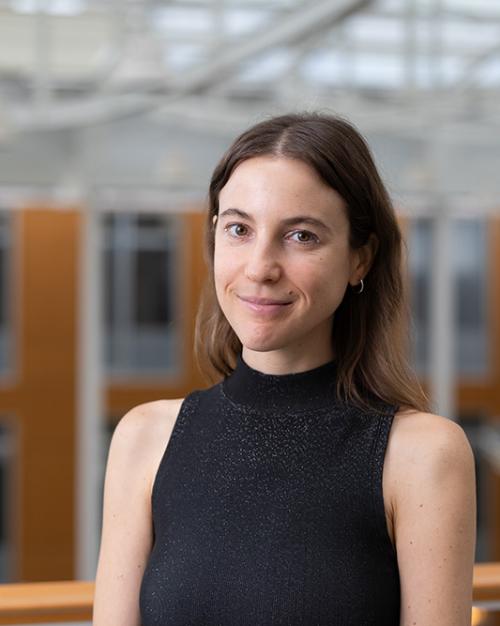Romina Wainberg, a Klarman Fellow in Romance studies in the College of Arts and Sciences (A&S), is writing a book that explores how early Latin American novelists depicted the act of writing in their fiction, with a particular focus on fictional representations of the writing process. Among these, Wainberg zooms in on examples of what she calls “unproductive writing,” acts of writing in defiance of societies which tout a narrative of productivity and progress.
“In the novels I examine, the protagonists – clerks, homemakers, enslaved peoples, former Indigenous leaders – use writing as a means to refuse productivity,” Wainberg said. “They pen in lieu of work – sometimes, to explicitly avoid working – and in defiance of social mandates that discourage them to write on the basis of their race, ethnicity, class and/or gender.”
Wainberg’s book project, “Against Productivity: Unproductive Writing in Early Latin American Fiction,” counters the dominant scholarly narrative which says that Latin American novels widely promoted and contributed to an era of production of national economies, national languages, national cultures and national literatures.
In the book, she writes about Gertrudis Gómez de Avellaneda’s novel “Sab” (Cuba, 1841); José de Alencar’s “The Guarani” (Brazil, 1857); Joaquim Maria Machado de Assis’s “The Posthumous Memoirs of Brás Cubas” (Brazil, 1881); and Teresa de la Parra’s “Iphigenia” (Venezuela, 1924).
These novels, Wainberg said, feature disenfranchised subjects writing in minor genres, such as notes, letters, scribbles and diaries to take a stance against racism, ethnocentrism or misogyny. Many of these characters also want to escape the oppressive experiences of domestic, pauperized and forced labor.
“Authors were invested not – or not just – in indoctrinating readers but above all in crafting good novels,” she said. “The ways in which they represented the writing process in their works are highly complex.”
Wainberg’s deep dive into this topic was inspired by her longtime fascination with not just the products but the process of writing, and the difficulty of explaining exactly what happens when one writes.
“Writing is simultaneously a technological, social, cognitive, gestural and environmental activity,” she said. “Since the 1990s, there’s been an explosion of interdisciplinary research on the definition of ‘writing,’ and Latin American studies has contributed a great deal to this area of inquiry.”
In her scholarship in general, Wainberg challenges existing interpretations of literature, said Edmundo Paz-Soldan, distinguished Professor of Arts and Sciences in Latin American Literature (A&S), Wainberg’s faculty host.
“When Romina asked me to sponsor her, I didn't hesitate to do it, because I saw we had plenty of shared interests, including the technological imaginary in Latin America and science fiction” he said. “I had already read an impressive article she wrote in which she convincingly argued that, contrary to certain interpretations which said that science was not so crucial for Latin American science fiction writers, science was actually very important for them – Jorge Luis Borges would be the obvious example here.”
In addition to scholarship on the act of writing, Wainberg also does research at the intersection of Queer theory and LGBTQ+ literature in the Americas. She has an article forthcoming in a literary journal on queer poetry, and she co-edited a book scheduled to publish Oct. 7: “Queer Latin American Voices” (Katakana, 2024).
At Cornell, Wainberg has found connections with the Departments of Romance Studies and Science & Technology Studies and the Feminist, Gender & Sexuality Studies Program.
In particular, interactions with Paz Soldán and Liliana Colanzi, assistant professor of Romance studies (A&S) – both prolific scholars and writers of speculative fiction and science fiction – have influenced Wainberg’s ongoing research centered on how creators of South American science fiction and Queer art in the 21st century imagine writing technologies of the future, a follow-up to her book project.
She enjoys interacting with graduate students and other postdoctoral researchers and welcomes questions and research discussions.
Wainberg is working with Paz-Soldán to plan an event series that will bring together scholars, writers and artists working at the intersection of writing, corporeality, technology and futurity. As part of the series, they will host the event “Monstrous Writings” on Oct. 16 at 4:45 p.m. in 164 Klarman Hall, featuring novelist Luciana de Luca and visual artist Jules Inés Mamone.




